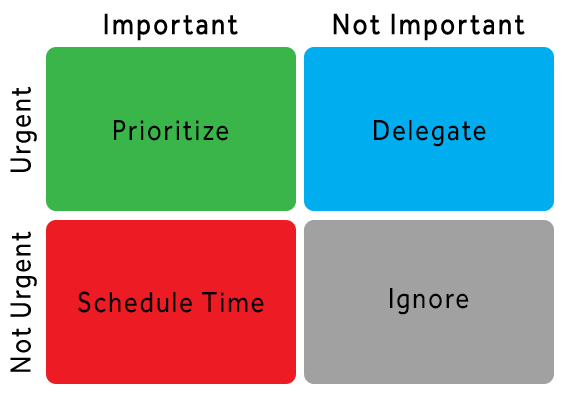How Sales Professionals Should Prioritize Their Time

In sales, there’s countless demands on your time. The incessant cascade of emails, phone calls, texts, meetings, digital and hard copy recordkeeping – one could literally spend virtually all of their waking hours doing nothing but engaging with all these demands. But that road leads to stress, burnout, and a risk of early death. So how do we make sense of it all?
Recognize that you are in control of how you spend your time.
Before you can even begin to conceive of a system to prioritize your time, you must realize that you’re the one who decides how to spend your time. Yes, you have certain hours you have to be in the office or on the road, depending on your specific sales role. And you have specific duties that are part of your job description.But within those parameters, how you divide your time and what tasks you focus on are largely up to you to decide. Once you accept this basic truth, a whole new world of freedom and possibility opens up to you.
Accept that most communications are not immediately time sensitive.
The impulse sales professionals often have is that everything needs to be acted on immediately – every email, every phone call, every message. The reality is, that’s not at all the case. Yes, there are some tasks that are legitimately urgent and should be attended to post-haste. But most of them aren’t.In fact, rushing to respond to everything can have negative consequences. First, it can result in suboptimal work. Some demands on our attention – such as information about a complex, multi-faceted problem or solution – need time and space for research and thought.
Second, it promotes attention deficit and bouncing from request to request for our energy and labor. Moving quickly between items has the potential for crossed brain wires, leading to you possibly, for example, responding to Client B what you meant to communicate to Client A – an awkward and embarrassing situation for everyone involved.
Third, you don’t have the space to breathe and relax – the endless race is taxing mentally, emotionally, and physically. Giving yourself a few minutes to unwind and detach from work – such as a coffee break or just stepping outside for fresh air and sun – helps calm a frazzled, hyperactive nervous system.
Create a system such as the Eisenhower Box for prioritizing items.
President Eisenhower accomplished a lot of things in his life, but one of his greatest, perhaps unsung, contributions to American society is the Eisenhower Box. Essentially, this is a box system – similar to the Prisoners’ Dilemma – that divides tasks into four quadrants along two axes – Important/Unimportant and Urgent/Not Urgent.Those items that are both Important and Urgent, do them now. For those that are important and not urgent, schedule a time to do it later. Not important, but urgent items should either be delegated to someone else, or, if there’s no one to delegate to, moved down the priority list. And for those things that are neither important nor urgent, ignore or discard them.
So in going through all your tasks, make decisions – what is genuinely important and what isn’t? What needs to be done quickly and what can be delayed to a later date? This might take some effort – especially initially – but over time, you can discern what’s most valuable (Note: You might be stunned to realize how many things fall in the Not Urgent category and just how much time you’ve spent on things that are in reality Not Important and Not Urgent).
Ask yourself what will help you achieve your sales goals.
Always keep in mind that you have sales goals, and that part of determining what gets priority is what will further those goals. Those opportunities not in your target market? Those may have much lower priority than the ones who are in your sweet spot. That small account that doesn’t have much growth potential? It may not be as important to service as the large account that’s generating you the most revenue.Also be aware that Urgency will often take precedence over Importance in terms of setting up your schedule. For example, while that big account is of higher importance than the small one, if the small one has an urgent need and the big one has a need that isn’t urgent, put the small one higher on the priority list.
To properly prioritize your sales duties, you need to figure out the hierarchy of importance and degree of urgency, then plot out your schedule based on the ensuing cross-tabulation. Having a plan will help you feel more comfortable, as well as maintain your mental health – which is vital to your long-term success as a sales professional.

- Account Planning (11)
- Awards (49)
- Client Testimonial (37)
- Personal Branding (19)
- Podcast (11)
- Research (70)
- Sales Career Development (87)
- Sales Coaching (156)
- Sales Consulting (137)
- Sales Culture (170)
- Sales Enablement (354)
- Sales Leadership (110)
- Sales Management (248)
- Sales Negotiation (16)
- Sales Prospecting (124)
- Sales Role-Playing (18)
- Sales Training (234)
- Selling Strategies (263)
- Soft Skills (70)
- Talent Management (94)
- Trusted Advisor (27)
- Virtual Selling (49)
- Webinar (9)



























